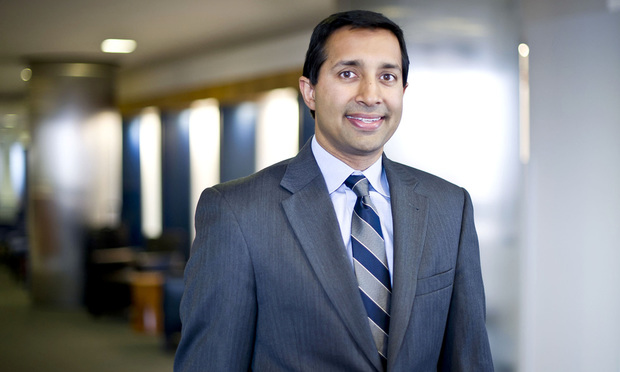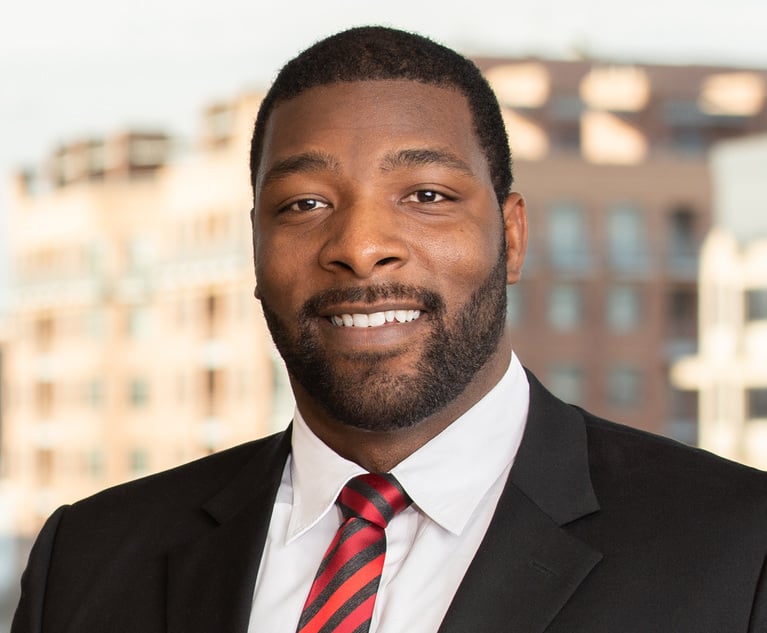Appellate Hot List 2019: Akin Gump Strauss Hauer & Feld
Pratik Shah discusses the firm's top U.S. Supreme Court win.
October 25, 2019 at 02:30 PM
2 minute read
 Pratik Shah of Akin Gump Strauss Hauer & Feld. November 10, 2015. Photo by Diego M. Radzinschi/THE NATIONAL LAW JOURNAL.
Pratik Shah of Akin Gump Strauss Hauer & Feld. November 10, 2015. Photo by Diego M. Radzinschi/THE NATIONAL LAW JOURNAL.
Tell us about your top U.S. Supreme Court or federal appeals court victory over the past year and how you and your team achieved the win.
Azar v. Allina Health Services: After a decade-long effort, Akin Gump achieved a major Supreme Court win against the U.S. [Department of Health and Human Services]. We broke new legal ground by securing notice-and-comment rulemaking protections under the Medicare Act, with much at stake for hospitals that treat a disproportionately large share of low-income patients. Our focus on plain-text arguments while debunking the government's parade of horribles led to a 7-1 Supreme Court victory creating important rule-making rights for all regulated parties—health care providers and beneficiaries alike.
How did your firm approach appellate success over the past year?
We focused on areas in which our appellate bench, working closely with our substantive expert practitioners, has developed market-leading expertise: health care, IP, Indian law, labor and bankruptcy. That has allowed us to tackle the most complex matters.
What is the most satisfying element of appellate practice in your opinion?
Discovering a new argument that can turn around a case. Although appellate lawyers are constrained by the record and waiver principles, we have found and developed winning jurisdictional arguments.
What's the most valuable lesson you learned as a young lawyer?
If your non-lawyer spouse, significant other or friend doesn't find your argument persuasive, then neither will a judge at oral argument.
Submitted by Pratik Shah, partner and co-chair of the Supreme Court and appellate group at Akin Gump Strauss Hauer & Feld.
This content has been archived. It is available through our partners, LexisNexis® and Bloomberg Law.
To view this content, please continue to their sites.
Not a Lexis Subscriber?
Subscribe Now
Not a Bloomberg Law Subscriber?
Subscribe Now
NOT FOR REPRINT
© 2025 ALM Global, LLC, All Rights Reserved. Request academic re-use from www.copyright.com. All other uses, submit a request to [email protected]. For more information visit Asset & Logo Licensing.
You Might Like
View All
Wilmer, White & Case, Crowell Among the Latest to Add DC Lateral Partners
4 minute read
Lawyers Across Political Spectrum Launch Public Interest Team to Litigate Against Antisemitism
4 minute read

Government Contracting Clients Look to Firms to Stay on Top of Trump Policy Changes
4 minute readTrending Stories
- 1Judge Finds Trump Administration Violated Order Blocking Funding Freeze
- 2CFPB Labor Union Files Twin Lawsuits Seeking to Prevent Agency's Closure
- 3Crypto Crime Down, Hacks Up: Lawyers Warned of 2025 Security Shake-Up
- 4Atlanta Calling: National Law Firms Flock to a ‘Hotbed for Talented Lawyers’
- 5Privacy Suit Targets Education Department Over Disclosure of Student Financial Data to DOGE
Who Got The Work
J. Brugh Lower of Gibbons has entered an appearance for industrial equipment supplier Devco Corporation in a pending trademark infringement lawsuit. The suit, accusing the defendant of selling knock-off Graco products, was filed Dec. 18 in New Jersey District Court by Rivkin Radler on behalf of Graco Inc. and Graco Minnesota. The case, assigned to U.S. District Judge Zahid N. Quraishi, is 3:24-cv-11294, Graco Inc. et al v. Devco Corporation.
Who Got The Work
Rebecca Maller-Stein and Kent A. Yalowitz of Arnold & Porter Kaye Scholer have entered their appearances for Hanaco Venture Capital and its executives, Lior Prosor and David Frankel, in a pending securities lawsuit. The action, filed on Dec. 24 in New York Southern District Court by Zell, Aron & Co. on behalf of Goldeneye Advisors, accuses the defendants of negligently and fraudulently managing the plaintiff's $1 million investment. The case, assigned to U.S. District Judge Vernon S. Broderick, is 1:24-cv-09918, Goldeneye Advisors, LLC v. Hanaco Venture Capital, Ltd. et al.
Who Got The Work
Attorneys from A&O Shearman has stepped in as defense counsel for Toronto-Dominion Bank and other defendants in a pending securities class action. The suit, filed Dec. 11 in New York Southern District Court by Bleichmar Fonti & Auld, accuses the defendants of concealing the bank's 'pervasive' deficiencies in regards to its compliance with the Bank Secrecy Act and the quality of its anti-money laundering controls. The case, assigned to U.S. District Judge Arun Subramanian, is 1:24-cv-09445, Gonzalez v. The Toronto-Dominion Bank et al.
Who Got The Work
Crown Castle International, a Pennsylvania company providing shared communications infrastructure, has turned to Luke D. Wolf of Gordon Rees Scully Mansukhani to fend off a pending breach-of-contract lawsuit. The court action, filed Nov. 25 in Michigan Eastern District Court by Hooper Hathaway PC on behalf of The Town Residences LLC, accuses Crown Castle of failing to transfer approximately $30,000 in utility payments from T-Mobile in breach of a roof-top lease and assignment agreement. The case, assigned to U.S. District Judge Susan K. Declercq, is 2:24-cv-13131, The Town Residences LLC v. T-Mobile US, Inc. et al.
Who Got The Work
Wilfred P. Coronato and Daniel M. Schwartz of McCarter & English have stepped in as defense counsel to Electrolux Home Products Inc. in a pending product liability lawsuit. The court action, filed Nov. 26 in New York Eastern District Court by Poulos Lopiccolo PC and Nagel Rice LLP on behalf of David Stern, alleges that the defendant's refrigerators’ drawers and shelving repeatedly break and fall apart within months after purchase. The case, assigned to U.S. District Judge Joan M. Azrack, is 2:24-cv-08204, Stern v. Electrolux Home Products, Inc.
Featured Firms
Law Offices of Gary Martin Hays & Associates, P.C.
(470) 294-1674
Law Offices of Mark E. Salomone
(857) 444-6468
Smith & Hassler
(713) 739-1250








